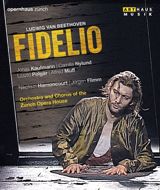|
|
|
|
|
|
|
|
|
Opera News, September 2016 |
| Robert Croan |
|
|
BEETHOVEN: Fidelio
|
|
|
 THIS
2004 FIDELIO from the Zurich Opera House is a curious, quirky performance in
which hardly any aspect, musical or theatrical, is traditional or expected.
That’s refreshing at times, but on its merits, the set is not competitive
with director Jürgen Flimm’s previous (entirely different) staging for the
Met four years earlier—a superlative production available on DVD from
Deutsche Grammophon. The rerelease of the Zurich disc may have been spurred
by the recent death of conductor Nikolaus Harnoncourt, along with the
presence of Jonas Kaufmann as Florestan. THIS
2004 FIDELIO from the Zurich Opera House is a curious, quirky performance in
which hardly any aspect, musical or theatrical, is traditional or expected.
That’s refreshing at times, but on its merits, the set is not competitive
with director Jürgen Flimm’s previous (entirely different) staging for the
Met four years earlier—a superlative production available on DVD from
Deutsche Grammophon. The rerelease of the Zurich disc may have been spurred
by the recent death of conductor Nikolaus Harnoncourt, along with the
presence of Jonas Kaufmann as Florestan.
Harnoncourt’s experience in
early music seems evident in his vision of the score. It’s a light concept,
in the spirit of the opera’s Singspiel format, marked by mostly brisk
tempos, transparent textures and a strong rhythmic framework that gives
added emphasis to the stressed beats. The booming peasant pulse in the fast
section of Rocco’s aria, and the lively pace of the little march that
precedes Don Pizarro’s entrance, are just two examples, but Harnoncourt can
surprise us with big tempo changes within a movement, or an unexpectedly
languid pace in “O namenlose Freude.”
In contrast to Flimm’s
updated, generic Third Reich-style production at the Met, the Zurich
production is set in Napoleonic times, against a minimalist set by Rolf
Glittenberg and not much more than a table and a chair or two for props. He
delays some important actions, such as Leonore’s waving the gun in the Act
II rescue quartet, and goes contrary to the libretto by placing Leonore and
Florestan far apart when the words say “my wife on my breast.” More
effective is his portrayal of an unusually nasty relationship between
Marzelline and Jacquino—until the final scene, when Jacquino prevents the
distracted girl from taking her own life.
Camilla Nylund’s bright,
cool soprano is a shade light for Leonore, but she weathers the role’s
heavier moments without strain or unsteadiness, and maintains credibility in
male disguise without losing her personal beauty or dignity. Kaufmann’s
bronzed voice is not quite a Heldentenor, and it is stretched to the limits
in the “Freiheit” conclusion to his aria, but even that works in favor of
the hallucinatory nature of the text. Every line is expressive, every phrase
colored with high emotion, in sound as well as his countenance and demeanor.
A strong asset is the warmly vocalized, humanely portrayed Rocco of the
late Laszlo Polgar, who vocalizes his comic aria with bel canto richness and
makes it clear that this jailer cares about the welfare of those in his
charge. Günther Groissböck also provides some excellent singing as Don
Fernando, though his single appearance in the finale is marred by motley,
confused staging of the vocally excellent chorus. By contrast, Alfred Muff
shouts and barks Don Pizarro’s music, enacting the villain with every
melodramatic cliché in the book.
Christoph Strehl’s aggressive
Jaquino is pungently vocalized, while Elizabeth Rae Magnuson’s pallid-tone
Marzelline is frequently unpleasant and out of tune. |
|
|
|
|
|
|
|
|
|
|
|
|
|
|
|